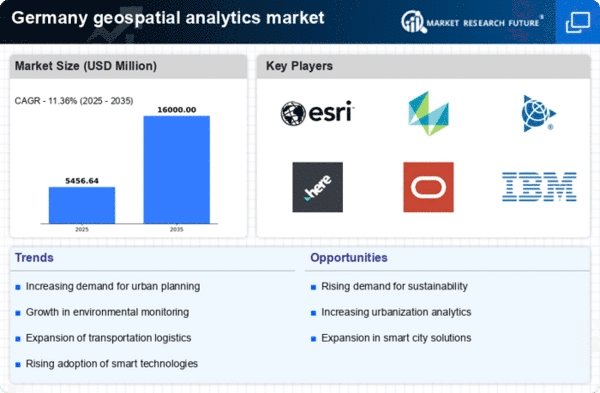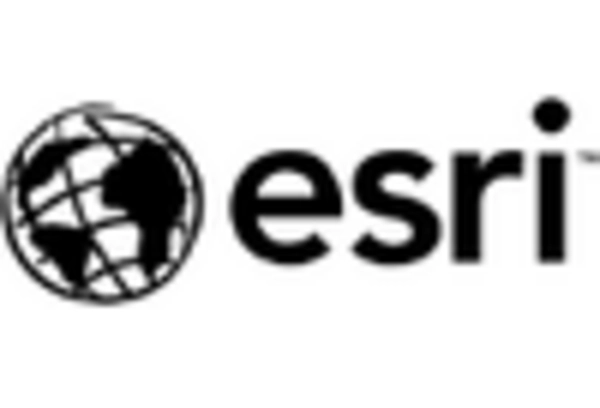Government Initiatives and Investments
Government initiatives aimed at enhancing infrastructure and urban development significantly influence the geospatial analytics market. The German government has been investing in smart city projects, which necessitate the integration of geospatial technologies for effective planning and management. For example, the Federal Ministry of Transport and Digital Infrastructure has allocated substantial funds to improve transportation networks, which rely heavily on geospatial data for analysis and decision-making. This commitment to infrastructure development is likely to drive the adoption of geospatial analytics solutions, as public agencies seek to optimize resource allocation and improve service delivery, thereby expanding the market.
Emergence of Big Data and Cloud Computing
The emergence of big data and cloud computing technologies is reshaping the landscape of the geospatial analytics market in Germany. The ability to process and analyze vast amounts of geospatial data in real-time is becoming increasingly feasible due to advancements in cloud infrastructure. This shift allows organizations to access powerful analytics tools without the need for extensive on-premises resources. As a result, businesses across various sectors are adopting cloud-based geospatial analytics solutions to enhance their operational efficiency and scalability. The market is anticipated to grow by 10% annually as more organizations leverage big data and cloud technologies to drive their geospatial analytics initiatives.
Rising Demand for Location-Based Services
The increasing reliance on location-based services is a pivotal driver for the geospatial analytics market. Businesses across various sectors, including retail, logistics, and transportation, are leveraging geospatial data to enhance operational efficiency and customer engagement. For instance, the retail sector utilizes geospatial analytics to optimize store locations and tailor marketing strategies based on consumer behavior patterns. This trend is reflected in the market's growth, with a projected increase of approximately 15% annually through 2026. As organizations recognize the value of precise location data, the demand for advanced geospatial analytics solutions is expected to surge, further propelling the market forward.
Advancements in Satellite and Drone Technologies
Technological advancements in satellite and drone capabilities are transforming the geospatial analytics market in Germany. The proliferation of high-resolution satellite imagery and the increasing use of drones for data collection enable more accurate and timely geospatial analysis. These technologies facilitate applications in agriculture, environmental monitoring, and urban planning, allowing stakeholders to make informed decisions based on real-time data. The market is projected to grow by 12% annually as organizations adopt these innovative technologies to enhance their analytical capabilities. Consequently, the integration of advanced satellite and drone technologies is likely to be a key driver in the evolution of the geospatial analytics market.
Growing Importance of Data-Driven Decision Making
The shift towards data-driven decision-making is a crucial factor propelling the geospatial analytics market in Germany. Organizations are increasingly recognizing the value of data in informing strategic decisions, leading to a heightened demand for geospatial analytics solutions. Industries such as healthcare, finance, and real estate are utilizing geospatial data to gain insights into market trends and consumer behavior. This trend is underscored by a reported increase in the adoption of analytics tools, with approximately 70% of companies in Germany indicating a commitment to data-driven strategies. As businesses continue to prioritize data analytics, the geospatial analytics market is expected to experience robust growth.
















